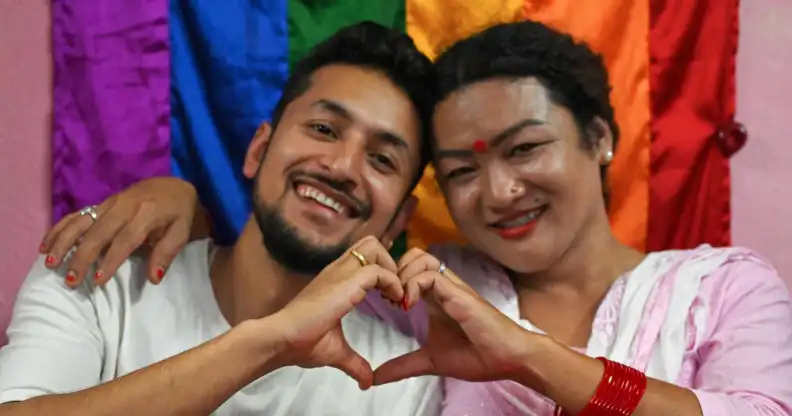For the first time ever a municipality in Nepal has followed an interim order by the country’s Supreme Court to register same-sex marriages. On November 29, authorities in Dordi, a municipality in the couple’s home district of Lamjung, legally recognized the marriage of Maya Gurung and Surendra Pandey.
Gurung, a transgender woman who is legally recognized as male, and Pandey, a cisgender man, held a Hindu wedding ceremony in 2017. They first attempted to legally register their marriage in June this year at the Kathmandu District Court, following an interim order by Nepal’s Supreme Court instructing authorities to register same-sex marriages while considering a case that argues for marriage equality across .
When that court rejected their registration, saying it did not need to recognize a couple that was not one legal male and one legal female, they appealed to the Patan High Court in September.
But the high court judges rejected the appeal, saying that it was the responsibility of the federal government to change the law before the lower authorities could register such marriages.
Nepal’s civil code currently only recognizes marriages between one man and one woman. The Supreme Court attempted to rectify that by ordering the creation of an interim registry for nontraditional marriages until parliament changes the law. The two lower courts then reversed the logic by claiming that the national law must be changed first.
Marriage equality – and other LGBT rights advances – have a long history in Nepal. In 2007, the Supreme Court ordered the government to form a committee to prepare a law legalizing same-sex marriage. In 2015 that committee recommended the government “grant legal recognition to same-sex marriage on the basis of the principle of equality.”
However, successive governments failed to bring legislation, leading to further court rulings. In March, the court ordered the government to recognize the marriage of a same-sex couple who had married in Germany.
Dordi officials have upheld the rights of Maya Gurung and Surendra Pandey and shown that it is possible for same-sex relationships to be recognized across the country. This is an example other officials should follow.



